The Light Between Oceans

This film is not going to fare well at the box office, I fear. People just don’t seem to want to go to sad movies anymore, or at least not like they used to. And “The Light Between Oceans,” while in many ways excellent, is definitely what you’d call a four-hanky picture.
Based on the novel by M.L. Stedman and adapted by writer-director Derek Cianfrance (“Blue Valentine”), it’s a tender, deliberately paced movie that takes the time to build the emotional world of its characters, so we can see how deeply events and their own tragic decisions etch themselves into their souls.
Some people will simply call it slow. Some people will call it mushy. Some people should probably go check out “Suicide Squad” in the next theater over.
Michael Fassbender plays Tom Sherbourne, a survivor of the trenches of World War I who returns to his native Australia without much purpose for living. He takes a job as lighthouse keeper on the remote island of Janus, which like the two-face god of mythology sits overlooking opposite directions, atop the convergence of two oceans.
On a trip back to the mainland he runs into Isabel (Alicia Vikander), a jolly lass who’s as full of life as Tom’s cup is dry. Through letters they have a long romance and courtship from afar, resulting in a happy marriage. The mainlanders are ecstatic for Is and Tom, since so few young men are left after the war and the prospect of a new generation leaves everyone giddy.
They return to Janus and set about building a jubilant life together. The island is stark and lonely, but they fill it with their passion. Is grows more independent and resourceful after a sheltered life; Tom shaves off his mustache (Is doesn’t like the prickles) and begins to set aside his guilt at living when so many have died.
But fate has its grim whirlpools and undertows. Is miscarries their baby. Most movies would skim over this with a mournful montage, but Cianfrance gives the event and its aftermath its full measure. We witness how losing their child permanently alters their approach to life and capacity for happiness. With time, they recover. They move on.
Then, it happens again.
This may be the end of things, at least for Is, when a tiny boat washes up on shore. Inside is a dead young man and a newborn baby girl. Tom prepares to do his duty and report in by telegraph. But Is, full of a furious maternal need, pleads for him to delay — for just a day or two, she says. He knows what this really means.
Fassbender and Vikander do a tremendous job of communicating much in between the dialogue. Some of the film’s most powerful scenes are the two simply staring at each other. Cianfrance carefully frames the actors so we’re often looking over their shoulders, as if stealing in on moments of intimacy rather than having them staged for us.
Things go on. The baby becomes a toddler and then a little girl, Lucy, all blonde curls and joy. Life on the island becomes idyllic, as if something from a storybook.
We know such pure happiness must end, like a tide reclaiming the beach. Much of the later developments center around Hannah (Rachel Weisz), the daughter of the rich fellow (Bryan Brown) who paid to build the lighthouse. But I’ll say no more.
“The Light Between Oceans” is not the sort of movie you see much of anymore. It’s slow-moving and contemplative, and dares to present the possibility that people can do things out of love but still cause immeasurable harm. Logically, many of the characters’ actions make no sense. But the actors and filmmakers paint such a rich emotional portrait, we feel like they could have come to no other decisions.
Go, and weep.



